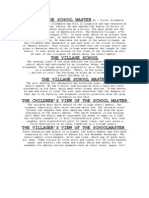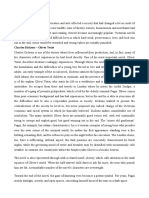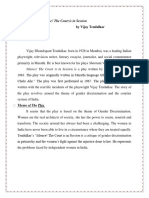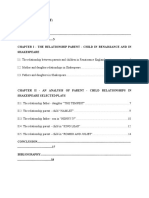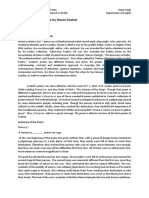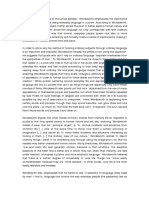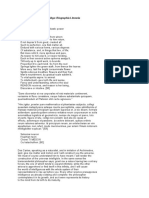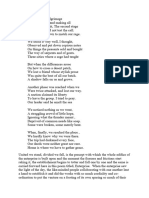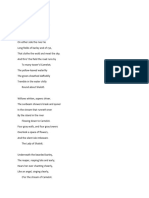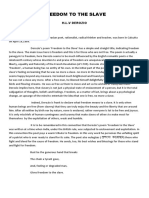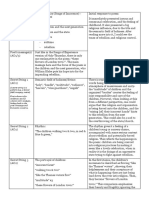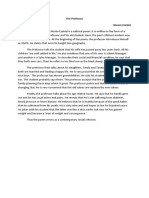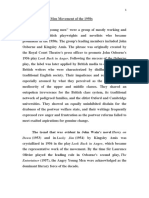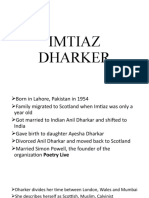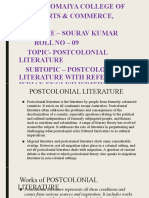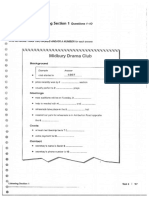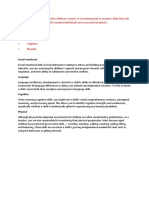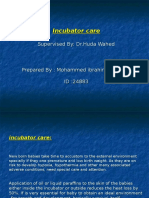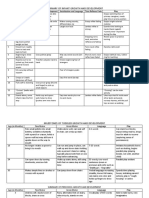The Professor - Nissim Ezekiel
The poem “The Professor” by Nissim Ezekiel is a satire on typical Professors of
India. In this poem which is a Dramatic Monologue, a Professor namely Professor
Seth meets a person who was once his student. The professor begins boasting
about himself and about his sons and sons-in-law. He mispronounces various
words and also uses the wrong phrases. The poem consists of a single stanza
having 35 lines. There is no particular rhyme scheme and the language is simple,
direct yet satirical.
The professor asks his student, “Remember me?” and then he replies that he is
Professor Sheth who once taught him geography. It was long ago. Now he is
retired, yet his health is quite fine. The very first lines give detail about the nature
of the professor. He rather seems to be a friend rather than a leader. His wife died
some years back. Narrating that, the professor begins boasting about his children.
According to him, all his children are well-settled in life now. He describes each of
them separately in terms of their position, One is Sales Manager, One is Bank
Manager.
Having said that he tells his student that Both have cars. The car is a token of
richness in India. Thus he wants to say that they are quite rich and well-settled
now. Next, he describes his 3rd son, who according to him is not so well.
Every family must have black sheep meaning that there is always a spoilt person in
every family and in his family it is his third son. Abusing one’s children is also a
tradition in Indian society.
Next, he describes the success of his daughters both in a quite orthodox Indian
way. He says that Sarala and Tarala are married. Rhyming names are very
common in India. We have Ram and Sham, Geeta and Seeta, Athar and Azhar,
Diksha & Divya, etc.
Rather than talking about which they have done by themselves, he says that both
his daughters are married and their husbands are very nice boys.
The professor then talks about his grandchildren who according to him are 11 in
number. These lines depict the mindset of a typical Indian father who feels proud
by the achievements of his sons but daughters are just a commodity for him ad
their identity is defined by the status and achievements of their husbands.
�After that, for the first time, he asks his student how many issues you have? Issues
here refers to children. In India, children are often called are issues. This sentence
is also quite wrong.
His student replies 3 but it has not been described in the poem. The professor then
says that it’s good because these are days of family planning- a wrong sentence.
He says that he is not against family planning as he believes in changing with the
time. The lines depict the hypocrisy of the professor. On one hand, he proudly tells
that he has 11 grandchildren which is a big number and on the other hand he
supports family planning as well.
He adds our progress is progressing meaning that we are progressing. Old values
are going, new values are coming. Again, quite humourous lines used by most of
the Indians. According to the professor they are doing well and progressing with
leaps and bounds.
The professor then says that he is going out rarely, now and then because he is old.
Yet his health is O.K. There is no Usual aches and pains, No diabetes, no blood
pressure, no heart attack because he has healthy habits which he follows regularly.
Again, after boasting himself again, he asks his student how healthy he is. The
student replies that he is quite healthy. The professor says that it is nicely i.e. quite
good.
Again he reverts back to himself. According to him, he will turn 69 that year and
hopes to cross 100 years. He then says that the student was very thin those days but
now he is healthy.
Now he (student) is a man of weight and consequence. In the last lines, the
professor offers his student to visit his humble residence which is just on opposite
house’s backside and the poem ends.


